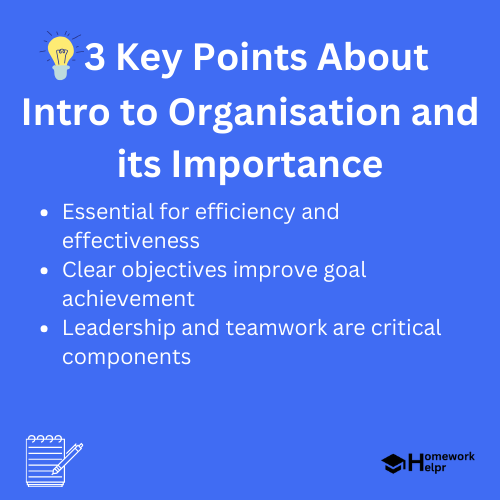📝 Summary
In today’s fast-paced world, understanding the concept of organisation is crucial for achieving efficiency and effectiveness. Organisation refers to a systematic arrangement of individuals and resources to accomplish specific goals. It plays a pivotal role in maintaining structure and overseeing progress across various types, including businesses and educational institutions. A well-organised structure enhances communication, ensures goal achievement, and increases accountability. Recognising the key elements and challenges of organisation empowers individuals to contribute effectively and fosters collaboration for greater success in personal and professional lives.
Introduction to Organisation and its Importance
In today’s fast-paced world, understanding the concept of organisation is crucial for achieving efficiency and effectiveness. Organisation refers to a systematic arrangement of individuals and resources to accomplish specific goals. Whether it’s a business, school, or a community group, organisations play a pivotal role in our lives. They help in maintaining structure, overseeing progress, and ensuring that objectives are met.
This article delves into the different aspects of organisation, its importance, and how it affects various facets of our daily lives. We’ll explore the elements that make up a successful organisation and why they are vital for both personal and professional growth.
What is an Organisation?
An organisation can be defined as a collection of individuals working together to achieve a common goal. It involves coordination and collaboration among team members, alongside the use of resources like time, money, and materials. There are various types of organisations, including:
- Business Organisations: Companies or firms that operate for profit.
- Non-Profit Organisations: Groups formed to provide social services or support charitable causes.
- Educational Institutions: Schools, colleges, and universities that aim to educate.
- Government Bodies: Entities that administer public policy and services.
The structure of an organisation is usually defined by its hierarchy, which includes different levels of authority and responsibility. Understanding these structures enables individuals to better navigate their roles and expectations.
Definition
Coordination: The act of organizing people or groups so that they work together properly and well.
Examples
For example, in a school, the principal coordinates teachers and staff to ensure that students receive a high-quality education.
The Importance of Organisation
Organisation is essential for various reasons that impact both individuals and groups. Here are some of the key benefits of being well-organised:
- Efficiency: A well-structured organisation minimizes waste and maximizes productivity.
- Goal Achievement: Clear objectives and responsibilities help in focusing efforts towards specific outcomes.
- Better Communication: Organised entities foster improved communication channels, reducing misunderstandings.
- Increased Accountability: With delineated roles, individuals are more accountable for their contributions.
By fostering an environment where everyone understands their responsibilities, organisations can operate smoothly and successfully.
❓Did You Know?
Did you know that the largest organisation in the world is the United Nations, which consists of 193 member states working towards international cooperation?
Key Elements of a Successful Organisation
A successful organisation comprises several fundamental elements. Knowing and implementing these components can significantly improve overall performance:
- Leadership: Visionary leaders inspire and guide their teams towards achieving common goals.
- Planning: Strategic planning helps define objectives, allocate resources, and set timelines.
- Resource Management: Effective use of human, financial, and physical resources is critical for operations.
- Teamwork: Collaboration among team members leads to innovative solutions and better outcomes.
These elements work in harmony to ensure that an organisation stays aligned with its goals and adapts to challenges in its environment.
Definition
Resource Management: The process of planning, allocating, and managing resources to optimize their use and ensure organizational efficiency.
Examples
For instance, a manager in a company may allocate tasks based on each team member’s strengths, ensuring optimum productivity.
Challenges Faced by Organisations
Despite their importance, organisations often face various challenges that can impede their effectiveness. These challenges include:
- Communication Barriers: Miscommunication can lead to confusion and inefficiency.
- Resistance to Change: Individuals may resist new processes or alterations to established routines.
- Resource Limitations: Lack of adequate resources can hinder productivity and innovation.
- Diversity Issues: Failing to manage diversity can lead to conflicts and a lack of cohesion.
Understanding these challenges can help organisations devise strategies to overcome them and enhance their performance.
Definition
Resistance to Change: An emotional or behavioral response by individuals or groups that aims to maintain the status quo, resisting new initiatives.
Examples
An example of resistance to change is when employees are hesitant to adopt new software that could improve their workflow.
Conclusion
In conclusion, organisations are a fundamental aspect of our society and play a significant role in shaping our personal and professional lives. Understanding the concept of organisation, its various forms, and its importance can empower individuals to contribute effectively in their respective environments. By recognising the key elements and challenges, we can act towards creating more efficient and successful organisations that achieve their goals while fostering a collaborative spirit among members. The mastery of organisation is not just relevant to large entities; individuals can also apply these principles to enhance their own productivity and success.

Related Questions on Intro to Organisation and its Importance
What is organisation?
Answer: A systematic arrangement of individuals and resources
Why is organisation important?
Answer: It impacts efficiency and overall effectiveness
What are key elements of successful organisations?
Answer: Leadership, planning, resource management, teamwork
What challenges do organisations face?
Answer: Communication barriers, resistance to change, resource limitations
